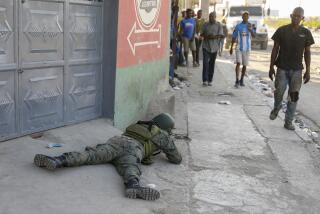Don’t Rule Out Use of U.S. Troops as an Option in Indonesia
- Share via
At last glance, the governments of Australia and the United States were strenuously, repeatedly and categorically denying a dramatic story that appeared last week in the respected Melbourne Age newspaper. It reported that both countries have worked on contingency plans to rush as many as 15,000 troops to the troubled Indonesian province of East Timor, if the situation there deteriorates. Official denial is the classic way for governments to go when they are not prepared to show all their cards. But rather than be embarrassed by the news story, Washington and Canberra should be lauded for not turning their backs.
In part, the official denials are designed to ease the domestic blood pressure of the Australian public, which is not at all eager for intervention, and of the U.S. public, which is scarcely ready for yet another one after the crisis in the Balkans. And Washington knows that Beijing--now trying to intimidate Taiwan--would surely go ballistic were Washington to engineer a Kosovo II: that is, intervene in the internal affairs of another sovereign state on humanitarian grounds, especially one in its own Asian backyard. Thus, the Canberra-to-Washington denials are politically understandable. But, in reality, serious conversations have taken place between the U.S. and Australian military establishments over what to do when East Timor goes haywire.
Indonesia is the world’s fourth-most-populous country, a complex and unsettled string of islands flung astride the South China Sea that’s moving in the direction of democracy. The salient question in Washington and Canberra is not whether the two longtime allies should consider military intevention, but under what conditions troops could be deployed, perhaps from Darwin, an Australian port city not far from East Timor’s coast. The U.S. hope, of course, is that by brandishing the stick, it won’t need to be used. No one in Washington wants to even imagine the reaction of China, still unhappy about the NATO intervention in Kosovo, not to mention the bombing of its embassy in Belgrade. Australian Prime Minister John Howard, ordinarily the most cautious of politicians, is firmly on record as saying that his government should not turn its back on a blood bath in the run-up to the autonomy plebiscite on Aug. 30, or in its aftermath. Anything is possible in East Timor. This week, paramilitary forces loyal to Jakarta and opposed to independence for East Timor went on a shooting rampage that targeted two pro-independence offices as well as the residence of a top U.N. official.
Officially, the Howard government takes the public line that intervention is not remotely under contemplation because, in the words of an Australian official, “significant pressure is being continually put on the government and military in Jakarta to see that there is a smooth and orderly transition” in East Timor. At the same time, points out Andrew Peacock, Australia’s ambassador to the U.S., “it is relevant to note that there was a significant change in Australia’s policy earlier this year.” He was referring to the letter Howard sent to President B.J. Habibie in December, urging him to do right by East Timor.
The current U.S. position is that no military intervention is possible without the approval of the U.N. Security Council. There, China would surely relish vetoing any such resolution. But logic would suggest that if a U.N.-sanctioned intervention was appropriate for Kosovo, with a pre-ethnic cleansing population of 2 million, then why would intervention by the West be inherently inappropriate for Indonesia, with at least 200 million people? It will weigh heavily on everyone’s conscience, not to mention China’s world image, if, as happened in the past with East Timor, the U.N. is forced to look the other way while pro-government paramilitary forces intimidate if not slaughter East Timor’s independence movement.
The Clinton and Howard governments are to be commended for facing this surpassingly important issue as squarely as the sentiments of their domestic public opinions permit. They are wise to have developed all suitable options to deal with all foreseeable contingencies. The best outcome would be for the military option to prove unnecessary, that Indonesia really is on the verge of a peaceful transition to democracy, like South Korea and Taiwan at the end of the 1980s. Indonesia is about to become the world’s third most populous democracy--or its No. 1 mess. Either way, it is impossible to ignore.
More to Read
Sign up for Essential California
The most important California stories and recommendations in your inbox every morning.
You may occasionally receive promotional content from the Los Angeles Times.













